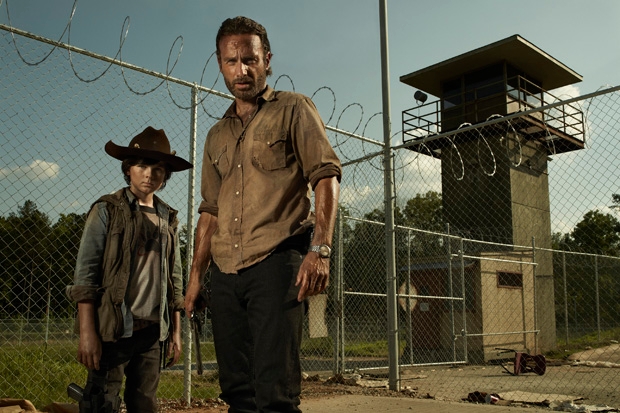I’m ashamed to say it took me a while to watch an episode of The Walking Dead, the fifth season of which has just begun. I was put off by the zombies. Too sophomoric, as far as I was concerned, only one notch above vampires. I’d stick with more grown-up fare, like The Sopranos and Breaking Bad.
I changed my mind after seeing The Mist, a forgotten horror film directed by Frank Darabont, the developer of The Walking Dead. I’m not a fan of The Shawshank Redemption, Darabont’s most famous film — all that heavy-handed Christian symbolism — but The Mist is a solid B-movie. It’s about a group of ordinary townsfolk trapped in a supermarket by giant squid-like monsters. These monsters are no less silly than zombies, but the film isn’t about them. It’s about the human beings they are trying to kill and the lengths those people will go to in order to survive. It explores the age-old question of whether our sense of right and wrong is integral to who we are or just a luxury that we’re happy to dispense with in the face of adversity.
I realised that the same was probably true of The Walking Dead and decided to give it a try. Episode one starts fairly predictably, with the protagonist coming round from a coma and discovering he’s living in a post-apocalyptic zombie dystopia, but it’s enlivened by a series of action sequences, each more audacious than the last. Clearly that’s one of the advantages of the zombie genre — every time there’s a lull in the proceedings, you can inject a bit of excitement by having the creatures appear from nowhere and launch a frenzied attack. The first episode ends with our hero marooned in a tank in the middle of Atlanta and, by then, I was cursing myself that I hadn’t discovered The Walking Dead sooner. But I was also happy because the series was midway through season three at that point, which meant that I had at least 20 episodes to watch before I caught up.
So what’s good about it? Well, as with all great television shows, it has some fantastic British actors in the cast. The main character, Rick Grimes, is played by Andrew Lincoln, who some of you may remember as Egg in This Life. Rick is the leader of the main group of survivors thanks to his abundance of masculine qualities, notably being tougher, more ruthless and better at fighting than anyone else. You get the impression that in his old life, where Rick was a low-ranking police officer, these qualities weren’t regarded as unalloyed virtues and he had to keep them in check to please his bosses and his overbearing wife. But in Zombie World, any ambivalence Rick feels about being an old-fashioned, patriarchal male falls away and one of the chief pleasures of The Walking Dead is watching him become the man he wasn’t allowed to be before. Rick often professes not to enjoy being one of the survivors and laments the brutalising effect the zombies have had on his fellow human beings. But it has also liberated him, and Lincoln is good at conveying Rick’s subconscious delight in becoming a powerful leader.
The Walking Dead also has a covert hero, a character called Daryl, who starts as a peripheral figure but becomes more and more compelling thanks to a transformation that, in many ways, is the opposite of Rick’s. Back in the old world, he was a social outcast, a violent criminal dominated by his psychotic elder brother. For Daryl, the zombie apocalypse isn’t a threat to his humanity, as it is for most of the other characters, but a chance for redemption. Gradually, and grudgingly, he learns what it is to belong to a community and have obligations to others, including women and children. Being surrounded by inhuman creatures enables him to become human.
What else? Big budgets help, enabling the programme makers to stage spectacular set pieces, and the writers don’t stint on the suspense, plunging Rick and his friends into mortal danger in every episode. But above all, it continues to worry away at the question of what human beings are really like, deep down, when the bonds of civilisation have been stripped away. I wrote off The Walking Dead as schlock, and in many ways it is. But it’s also a brilliant psychological experiment, a grown-up version of Lord of the Flies, and the best thing currently on television.
Toby Young is associate editor of The Spectator.







Comments